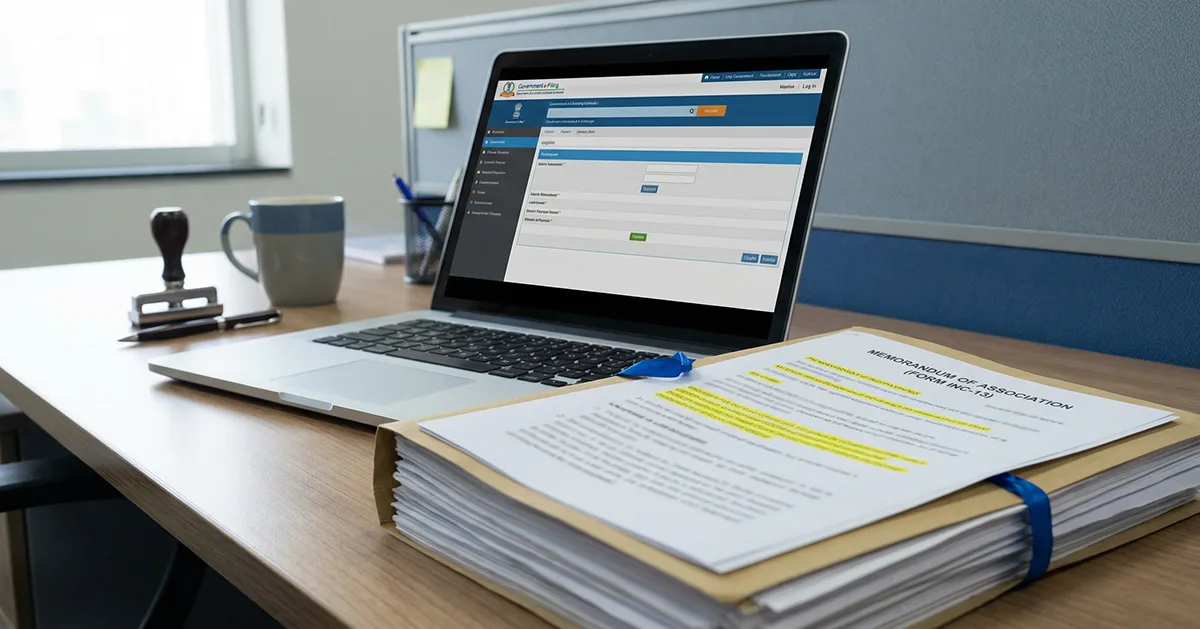
Section 8 enterprises are non-governmental organizations established to support various charitable and holistic interests, including sports, arts, etc. With incorporation, fulfilling Section 8 company compliance is the next step.
Compliance for Section 8 company refers to the mandatory legal, financial, and regulatory requirements as per the Companies Act, 2013. Although these companies enjoy certain exemptions and benefits, they are still required to comply with strict annual, event-based, and statutory filings with the Ministry of Corporate Affairs (MCA) and other authorities.
What is a Section 8? Key Benefits
A Section 8 business is an organization that wants to utilize its earnings for the promotion of the following areas: science, research, sports, commerce, education, charitable purposes, religion, the arts, and the environment.
Section 8 company incorporation results in the existence of a limited firm, even if its name does not have the word “Limited” at the end.
Benefits of Section 8 for Companies
Companies provide several benefits to anyone seeking to establish a charitable organization. They are composed of:
- Section 8 corporations have greater flexibility and are required to carefully accomplish non-profit objectives.
- The Companies Act, 2013, simplifies the Section 8 registration process and eliminates the need for partners or members to be present in person. Businesses are registered under this legislation.
- The amount of paid-up capital for Section 8 firms has no upper or lower limit.
- By utilizing the tax advantages offered by registration under Sections 12A and 80G of the Income Tax Act, businesses can significantly reduce their tax payments.
- Partners or members of any company or firm are eligible to serve as directors of a Section 8 corporation. This advantage is useful for anybody wishing to utilize their work to advance society.
Compliance for Section 8 Company: Detailed List
Section 8 companies are governed by specific compliance standards similar to other corporate entities. Compliance obligations can be grouped into three main categories:
- Time-based (periodic) compliance – Annual and recurring filings
- Event-based compliance – Triggered by specific corporate events
- Criteria-based compliance – Based on size, activities, or changes within the company
Let’s dissect all compliance requirements one by one.
1. Complying with Tax Laws for Section 8 Businesses
In India, Section 8 companies must make timely tax payments in order to stay in operation. These companies are subject to certain tax-related rules even though they are non-profit organizations.
a. Income Tax
Corporations designated as Section 8 are free from paying taxes under Sections 11 and 12 of the Income Tax Act of 1961. To benefit from these exemptions, the company must use all its profits for charitable or religious purposes and not for the personal gain of any member or group of members.
The company shall use the donation proceeds to advance the objectives stated in its Memorandum of Association (MoA).
b. 12A Registration
To qualify for income tax exemptions, Section 8 enterprises must obtain a 12A registration from the Income Tax Department. This registration provides tax-exempt status for the organization’s charitable endeavor income.
c. 80G Registration
In order to allow donors to deduct contributions from their taxes, Section 8 enterprises may also apply for 80G registration. It provides rewards for people and organizations who support the company’s humanitarian goals.
d. TDS (Tax Deducted at Source)
For example, if a Section 8 company is paying contractors or suppliers, it must deduct TDS at the proper rates and deposit it with the government within the specified time frames.
e. Goods and Services Tax (GST)
Section 8 businesses must pay GST if their annual revenue exceeds the threshold prescribed under the GST Act. They must register under GST, file regular GST returns, and abide by all applicable rules and regulations.
f. Foreign Contribution Regulation Act (FCRA)
If the Section 8 business accepts foreign donations, it must abide by the Foreign Contribution Regulation Act (FCRA) requirements. To accept grants and gifts from abroad for charitable reasons, one must register with the FCRA.
g. Form 10BB
Files including Form 10BB from Section 8 companies must be sent to the Income Tax Department. This form contains details on the money received and the steps taken to achieve the company’s objectives.
h. Requirements for Audits
Section 8 companies must appoint a qualified chartered accountant to audit their records every financial year, regardless of turnover. It is necessary to provide the audit report to the Income Tax Department together with the annual income tax return.
Compliance Documents:
The Directors, Shareholders, Registered Office, and other relevant facts about the company are all listed in detail in the Annual Return (Form MGT-7).
Form AOC-4: Use this form to provide the financial accounts of the business to the Registrar of Companies.
Form ADT-1: This form is filed when a company auditor is designated.
Check out the latest compliance calendar for Section 8 Company and don’t miss out on any upcoming requirements.
2. Annual Compliance for Section 8 Company in India
Under Section 8, businesses are subject to several legal obligations and various annual compliance reports. The following are compliance requirements a Section 8 company must comply with every year:
a. Appointment of Auditors
Every Section 8 company must appoint an auditor under Section 139 of the Companies Act, 2013, to oversee its annual financial reporting. Form ADT-1 must be provided to the MCA, informing them of the auditor’s appointment as well as other pertinent information.
The company appoints an auditor for a maximum term of five financial years to examine its annual financial statements. The company must appoint the auditor within 15 days of the Annual General Meeting (AGM). If the company fails to file Form ADT-1 within the prescribed deadline, it attracts a penalty.
b. Maintaining Statutory record
Under Section 8 of the Companies Act of 2013, firms are required to maintain a record that contains details on:
- Loans they have taken out,
- Biographies of their directors,
- Changes to their directorship,
- Charges they have made, and
- Investments they have made.
c. Conduct Meetings
In addition to their twice-yearly annual general meetings, Section 8 companies are also required to conduct extra-statutory meetings.
d. Report from the Board of Directors
All company directors are obliged to review the Director’s Report, which contains information on the business’s accounting, compliance, corporate social responsibility, and other appendices. The report must be turned in with the AOC-4 Form.
Failure to submit the AOC-4 Form within 30 days following the AGM date will result in penalties for the business.
e. Preparing Financial Statements
A cash flow statement, balance sheet, and profit and loss statement are among the financial statements that the company is required to provide. These documents have to be filed with the Registrar of Companies (ROC) and submitted to an audit by an auditor.
Failing to file the MGT-7 Form within 60 days of the AGM date will result in penalties for the business.
f. Submission of Income Tax Return
By September 30 of each year, Section 8 enterprises must file their Income Tax Returns, which provide an overview of their total revenue.
Penalties for Failure to Comply with Section 8
Like any other recognized company, Section 8 organizations are bound by a set of guidelines from the MCA. If they disregard these instructions, there will be repercussions. A Section 8 Company may face the following penalties for non-compliance:
- If the Central Government determines that the company is operating dishonestly or in opposition to its stated goals, it may cancel the license.
- The fine assessed on the company might reach Rs. 1 crore and should not be less than Rs. 10 lakh.
- Violations of the agreement might result in jail time and fines of up to Rs. 25 lakhs for the company’s directors or anybody else.
- If it is demonstrated that the company is conducting fraudulent operations, every officer in default will be held responsible for their actions under Section 447 of the Companies Act, 2013.
Hence, to prevent penalties, Section 8 Companies are required to comply with all regulations. By doing this, they can maintain their legal status and fulfill their specific roles. Catch up on your left-out compliance requirements for the Section 8 company with expert service providers like RegisterKaro. Fill the form and get a customized quote instantly.
Frequently Asked Questions
Section 8 company compliances refer to the mandatory legal, financial, and regulatory obligations that a non-profit company must follow after incorporation. These include ROC filings, maintenance of statutory registers, annual filings, and adherence to provisions of the Companies Act, 2013. Proper compliance ensures the company continues to enjoy Section 8 status and tax benefits.




